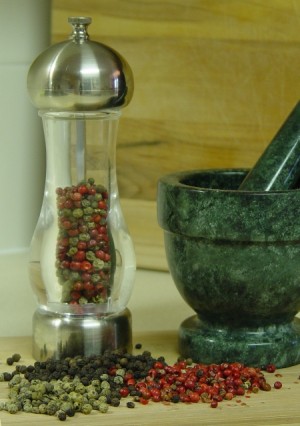‘There’s certainly too much pepper in that soup!’ Alice said to herself, as well as she could for sneezing.
— Lewis Carrol, Alice in Wonderland (1865)
My spice cupboard is starting to get terribly messy. I have to get to work cleaning it up and getting things organized before Christmas baking starts. Anyway, I thought this would be a good time to start making some notes about the spices we use when we cook…
Contents
Black Pepper:

After salt, black pepper is the most common spice used in cooking today. It is also one of the oldest. It was a particularly important part of the spice trade between Europe and Asia. At some points, black pepper was even used as a currency.
Black peppers (latin name: Piper Nigrum) are native to India, but in recent years, Vietnam has been the world’s biggest producer and exporter.
Pepper comes from a vine with a smooth, woody stock that grows in hot, humid tropical climates. The plant can be as high as 33 feet. The plant will grow small white clusters of flowers that will eventually produce berries. These berries are called peppercorns, and when dried and ground, become the spice that we know as black pepper.
As you probably already know, black pepper is not the only type of pepper available. You can also find white pepper, green pepper, and red pepper.
Black Pepper:
As mentioned above, black pepper is produced from the dried berry of a vine. The green unripe berries (or drupes) are harvested and cooked in hot water to clean them. The berries are then dried in the sun or by machine for several days. During this time, the skin shrinks and darkens. It finally ends up black and wrinkled. When the drying is complete, the berry is called a peppercorn.
White Pepper:
White pepper comes from the same plant as black pepper, and is produced in exactly the same way. The difference is that once the berry has dried, the skin is removed by a process called retting. The peppercorns are soaked in water for about a week. The skin decomposes, and can then be rubbed off, leaving just the white seed. The skin can also be removed by chemical or mechanical processes these days.
Green Pepper:
Once again, green pepper is the same as black and white pepper. In this case, the unripe berries are treated in a way that allows them to retain their colour. They may be treated with sulfur dioxide or freeze dried. It is also possible to find pickled peppercorns where the unripe berry has been preserved in brine or vinegar.
Red Pepper:
Red pepper comes from a totally different plant. Red peppercorns have a red paper-like skin that surrounds a small, hard seed.
Nutrition Facts:
Two teaspoons of Black pepper is a good source of iron and vitamin K. Black pepper also contains manganese and dietary fiber.
| Black Pepper: 2 tsp, 10.9 calories | ||
| Nutrient | Amount | %DV |
| Manganese | 0.24 mg | 12 |
| Vitamin K | 6.9 mcg | 8.6 |
| Iron | 1.24 mg | 6.9 |
| Dietary Fiber | 1.12 g | 4.5 |
Health Benefits:
I have heard that black pepper stimulates the taste buds in a way that triggers increased acid production in the stomach. This apparently aids in digestion. Black pepper also has anti-oxidant and anti-bacterial properties. However, I’m not sure how much pepper you would need to eat to receive any benefit from these properties.
Other Health Issues:
As everybody knows from Saturday morning cartoons, black pepper makes you sneeze. I have read that a substance called piperine irritates the nostrils and causes you to sneeze. Apparently, there has never been a scientific study done to prove this.
From time to time, black pepper has been linked to salmonella outbreaks.
Cooking:
As mentioned, black pepper is one of the most widely used spices. It is used to season many different recipes. It is also featured in some recipes such as pepper steak.
White pepper is generally used in dishes that are light in colour and flecks of black pepper are undesirable.



I came across your site from the foodieblogroll and I’d love to guide Foodista readers to your site. I hope you could add this black pepper widget at the end of this post so we could add you in our list of food bloggers who blogged about black pepper, Thanks!